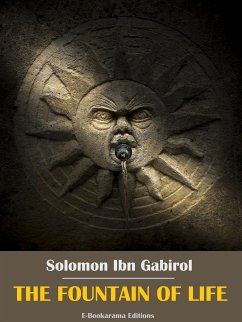Solomon ibn Gabirol, also known as Avicebron, was a Spanish-Jewish poet and philosopher of the eleventh century and his major philosophical work is the " Fons Vitae," or "The Fountain of Life."
In this text, Ibn Gabirol uses a Socratic dialog as a framework to discuss his theory of the 'First Cause.' Written in Arabic, the Fons was translated into Latin in the 12th century, The work was attributed to 'Avicebron,' who was not identified as Jewish but as Christian or possibly Muslim. One reason is that Ibn Gabirol does not reference the Tanakh or Talmud, as would be normal for a Jewish intellectual from this time and place. In addition, his neo-Platonic views seem to place him in a more Christian intellectual current. However, in 1846, a scholar named Solomon Munk announced that he had discovered that Avicebron was the same person as Ibn Gabirol.
Ibn Gabirol is well known in the history of philosophy for the doctrine that all things —including soul and intellect—are comprised of matter and form (“ Universal Hylomorphism”), and for his emphasis on Divine Will.
In this text, Ibn Gabirol uses a Socratic dialog as a framework to discuss his theory of the 'First Cause.' Written in Arabic, the Fons was translated into Latin in the 12th century, The work was attributed to 'Avicebron,' who was not identified as Jewish but as Christian or possibly Muslim. One reason is that Ibn Gabirol does not reference the Tanakh or Talmud, as would be normal for a Jewish intellectual from this time and place. In addition, his neo-Platonic views seem to place him in a more Christian intellectual current. However, in 1846, a scholar named Solomon Munk announced that he had discovered that Avicebron was the same person as Ibn Gabirol.
Ibn Gabirol is well known in the history of philosophy for the doctrine that all things —including soul and intellect—are comprised of matter and form (“ Universal Hylomorphism”), and for his emphasis on Divine Will.









